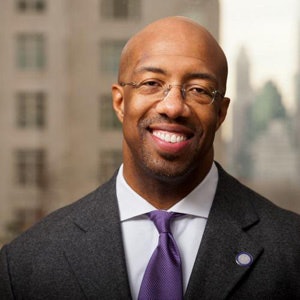The term “work college” conjures up images of a place like Berea College, in Kentucky, where students work in the fields to help sustain the college. At Paul Quinn College, students also grow organic produce on campus grounds.
Unlike rural Berea, however, Paul Quinn is located in the Dallas metro area, and the farm where students grow crops was developed on what once was the school’s football field. The goalposts are still in place, as a reminder of the space’s former use.
 Paul Quinn College President Michael Sorrell
Paul Quinn College President Michael SorrellTwo years after embracing the work college model, Paul Quinn will officially join the ranks of schools such as Berea that have earned federal recognition as a work college. According to Paul Quinn President Michael Sorrell, the U.S. Department of Education (ED) notified the college via email that it had been approved for the federal work college designation on Monday morning.
As such, Paul Quinn is the first urban, historically Black institution to gain that designation, joining the ranks of the eight existing work colleges, a consortium that includes Alice Lloyd College, Berea, Blackburn College, the College of the Ozarks, Ecclesia College, Sterling College, and Warren Wilson College. An eighth school, Bethany Global University, gained federal recognition as a work college last year, but has yet to join the Work College Consortium (WCC).
All Paul Quinn students now have jobs on campus or with local businesses, after the college adopted the work college model in fall 2015. In return, students receive a significant reduction in tuition, paying a total of $14,500 if they chose to live on campus. Students living off campus pay even less.
The goal is to reduce the debt burden for graduates, Sorrell said. “You can graduate with less than $10,000 in debt,” he explained. Since approximately 80 percent of Paul Quinn students are Pell Grant eligible, many receive federal dollars that help reduce the cost of tuition even further.
“We think the idea of telling people who grew up in underresourced and poverty stricken communities that their way out is through (college) debt is ridiculous,” Sorrell commented.
Before joining the Work Colleges Consortium (WCC) and earning federal approval as a work college, institutions must meet ED guidelines for work colleges for two years.
When reached by phone on Monday, a WCC representative said that federal work colleges receive federal funding through an allocation within the federal work-study program. The allocation is then divided among work colleges. However, it is not clear how that allocation might be impacted by proposed funding cuts to the federal-work study program.
In the budget proposal put forward last week, the new administration seeks to cut funding for federal work-study and redesign the program to direct more dollars to “undergraduate students who would benefit most.” As has historically been the norm, the president’s budget proposal is expected to undergo numerous revisions in Congress. As a result, it does not necessarily represent the final word on what will happen to the federal work-study program.
ED did not respond to requests for comment on Monday about Paul Quinn’s work college designation.
Aside from potentially benefiting from federal dollars, receiving the federal work college designation has a symbolic impact, Sorrell said.
“It is an acknowledgement of the work that we do,” Sorrell said. “It’s an acknowledgement that there is space in the marketplace for a new model, because we’re not a traditional work college. We’re not in a rural community. Our students are urban students.”
Paul Quinn is the oldest historically Black college west of the Mississippi River, founded as the Connectional School for the Education of Negro Youth in 1872. Along with approximately 90 other presidents and chancellors of historically Black colleges and universities (HBCUs), Sorrell visited Washington, D.C., in late February.
Sorrell said that he did not attend the meeting with President Trump, in which 64 of his colleagues packed into the crowded Oval Office for a brief meet and greet, but did attend meetings with congressional leaders the following day. Sorrell said that it remains to be seen whether congressional leaders would follow through on some of the proposals that HBCU presidents and chancellors made during their visit to the Capitol, such as renewing the year-round Pell Grant program or increasing existing funding for Title III programs.
“Anyone who advocates for some of the communities that have been shown to be somewhat out of favor right now has to be concerned,” he commented.
Despite general concerns about funding for education overall, there is still a strong argument for work colleges, according to Sorrell.
“We’re not asking for handouts,” he said. “We’re positioning our students to have an opportunity through the acquisition of a strong liberal arts education, but also professional training, so that when they graduate they are ready for a career.”
Staff writer Catherine Morris can be reached at [email protected].


















